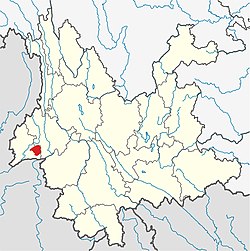Chiefdom of Mangshi
Chiefdom of Mangshi 芒市土司 | |||||||||
|---|---|---|---|---|---|---|---|---|---|
| 1443–1955 | |||||||||
 Territory in modern Yunnan | |||||||||
| Status | Native Chiefdom of China | ||||||||
| Capital | Mangshi | ||||||||
| Common languages | Tai Nuea language | ||||||||
| Government | Monarchy | ||||||||
| Tusi | |||||||||
• 1443–1459 | Fang Dingzheng (first) | ||||||||
• 1948–1955 | Fang Yulong (last) | ||||||||
| History | |||||||||
• Established | 1443 | ||||||||
• Disestablished | 1955 | ||||||||
| |||||||||
| Today part of | China | ||||||||
The Chiefdom of Mangshi, officially Mangshi Yuyi Zhangguansi and Mangshi Anfusi was a Dai autonomous Tusi chiefdom in the west of Yunnan, China from 1443 to 1955. In 1443, the Ming dynasty established Mangshi Yuyi Zhangguansi (芒市御夷长官司) because a Mangshi chief made a contribution in Luchuan–Pingmian campaigns, and then upgraded to Mangshi Anfusi (芒市安抚司) in 1640. Chiefdom of Mangshi has an absolute dictatorship in politics, military, economy at the territory, and use the rule of primogeniture.[1]
In the Republic of China period, the central government used many methods try to abolish the Chiefdom of Mangshi, for example, established a direct control government "Luxi Administrate Bureau" (潞西设治局).[1] But the Chiefdom of Mangshi allied with other chiefdoms to counteract the abolishment. At its worst, chiefdoms had a consideration for independence from China. Finally, the central government compromised with chiefdoms.[2]
After People's Republic of China controlled this area, the central government launched the Chinese Land Reform Movement. The last Chief of Mangshi, Fang Yulong lost his power and land, finally abolished in 1955.[3]
Saophas
- Fang Htin Chang 放定正 1443-1459
- Vacant 1459-1465
- Fang Kyan Hpa 放贞 1465-1487
- Vacant 1487-1506
- Fang Kloe Hpa 放革 1506-1518
- Vacant 1518-1523
- Fang Fu Hpa 放辅 (放福) 1523-1573
- Fang Kawn Hpa 放国忠 1573-1591 (kill in 1591 due to Yue Feng revolution)
- Fang Wei Hpa 放纬 1592-1595, object by Lui Dadao 刘大刀 (刘𬘩) general of Ming Dynasty
- Vacant 1595-1596
- Fang Phon Hpa 放珀 1596-1639 (son of Fang Wei Hpa)
- Vacant 1639-1640
- Fang Htoen Hpa 放廷臣 1640-1647 (son of Fang Phon Hpa, kidnapped by the Burmese military in 1647)
- Vacant 1647-1648
- Fang Kang Hpa 放国璋 1648-1658 (son of Fang Htoen Hpa)
- Vacant 1658-1661
- Fang Arb Hpa 放爱众 1661-1664 (son of Fang Kang Hpa)
- Vacant 1664-1668
- Fang Htien Tien 放廷弼 1668-1673 (son of Fang Kang Hpa)
- Fang Hmi Kaeo 放弥高 1673-1685 (son of Fang Arb Hpa)
- Fang Hmi Hkoeng 放弥合 1685-1694 (younger brother of Fang Hmi Kaeo)
- Vacant 1694-1696
- Fang Htiet Hpa 放天球 1696-1713 (son of Fang Hmi Hkoeng)
- Vacant 1713-1716
- Fang Woen Hpa 放仁 1716-1738 (first son of Fang Htiet Hpa)
- Vacant 1738-1741
- Fang Suan Hpa 1741-1770 放作藩 (son of Fang Woen Hpa) 1st
- Vacant 1770-1771
- Fang Ngoen Chang 1771-1772 放愈彰 (suicided himself by hanged)
- Fang Suan Hpa 放作藩 1772-1774 2nd
- Fang Waep Hpa 放愈著 1774-1796 second son of Fang Suan Hpa
- Vacant 1796-1798
- Fang Hso Kyaung 放泽重 1798-1816 son of Fang Waep Hpa
- Fang Vien Hpa 放愈新 1816-1821 killed by the revolt
- Fang Hso Hao 放泽浩 1821-1826 cousin of Fang Vien Hpa
- Fang Choen Hpa 放承恩 1826-1849 first son of Fang Hso Hao
- Fang Chuen Hpa 放世恩 1849-1858 younger brother of Fang Choen Hpa
- Vacant 1858-1875
- Fang Ching Liu 放庆禄 1875-1877 first son of Fang Chuen Hpa
- Vacant 1877-1879
- Fang Ching Chang 放庆寿 1879-1889 younger brother of Fang Chuen Hpa
- Fang Ching Yung 放庆雍 1889-1889 younger brother of Fang Ching Chang
- Fang Chang Ngue 放正德 1889-1910 son of Fang Ching Liu
- Fang Hkue Mawng 方克明 1910-1931 son of Fang Chang Ngue
- Vacant 1931-1933
- Fang Vien Rung 方云龙 1933-1936 son of Fang Hkue Mawng
- Fang Hkue Hkwan 方克光 1936-1953 third son of Fang Chang Ngue
- Fang Hkue Chang 方克胜 1944-1948 fourth son of Fang Chang Ngue (became saopha of Mongmao)
- Fang Vieng Rung 方御龙 1948-1955 (became saopha with Fang Hua Rung during 1953-1955) fifth son of Fang Chang Ngue
- Fang Hua Rung 方化龙 1953-1955 (last saopha) younger brother of Fang Vieng Rung
References
- ^ a b 云南省潞西县志编纂委员会 (1993). 潞西县志 [Annals of Luxi County] (in Chinese). Kunming: Yunnan Education Publishing House. ISBN 7-5415-0685-0.
- ^ 王春桥 (2015). "土司存废与国家统一(1944~1948)" [Maintenance or abolishment of Tusi chieftain system and unification of China (1944-1948)]. Journal of Yunnan Minzu University (Social Sciences) (in Chinese). 32 (1): 103–108. doi:10.13727/j.cnki.53-1191/c.2015.01.015.
- ^ 德宏史志编委会办公室 (1986). 德宏史志资料 第七集 [Annals material of Dehong, Volume 7] (in Chinese). Mangshi: Dehong Nationalities Publishing House.
- CS1 uses Chinese-language script (zh)
- CS1 Chinese-language sources (zh)
- Articles containing Chinese-language text
- Tusi in Yunnan
- Former countries in Chinese history
- Mangshi
- States and territories established in the 15th century
- States and territories disestablished in the 20th century
- 1955 disestablishments in China